Postpartum wind-stroke and related syndromes:an introduction of postpartum wind-stroke, postpartum wind-stroke and spasm of limbs, postpartum blood-wind, and related syndromes.
-
 ✵Gynecology of TCM is a branch to study the physiological and pathological characteristics of women and to prevent and treat syndromes specific to women. Gynecology of TCM research scope including irregular menstruation, amenia, metrorrhagia, infertility, postpartum syndromes, breast syndromes, and miscellaneous syndromes, etc.
✵Gynecology of TCM is a branch to study the physiological and pathological characteristics of women and to prevent and treat syndromes specific to women. Gynecology of TCM research scope including irregular menstruation, amenia, metrorrhagia, infertility, postpartum syndromes, breast syndromes, and miscellaneous syndromes, etc.
- Postpartum wind-stroke and related syndromes.
-
✵Postpartum wind-stroke and related syndromes are also known as the wind-stroke syndromes of women after childbirth, a series of wind-stroke type syndromes of women following childbirth. It is also known as wind-stroke syndromes after childbirth.
✧ In the TCM system, the pathogenic reasons for the postpartum wind-stroke normally are hurt of Qi and blood due to childbirth, Qi deficiency, blood deficiency, deficiency in the interior, hurt of Zang-viscera and Fu-viscera, hurt of blood collaterals, and affections from exogenous wind and cold pathogens, affected by emotions, such as sorrow or anger. Common related symptoms observed are pain and numbness, fatigue and emaciation, short of breath, other symptoms commonly observed include going into trance, spasm, etc. The wind-stroke related syndromes are understood due to similar reasons and also specific reasons, with similar symptoms and specific symptom observed.
✵The women wind-stroke syndromes after childbirth, and wind-stroke related syndromes are introduced: postpartum wind-stroke, postpartum palpitation wind stroke, postpartum wind stroke and trance, postpartum wind-stroke and spasm of limbs, postpartum wind stroke with spontaneous perspiration, postpartum wind stroke with hemiplegia, postpartum blood-wind, postpartum syndrome similar to stroke, postpartum limbs numbness, etc.
- Postpartum wind-stroke.
-
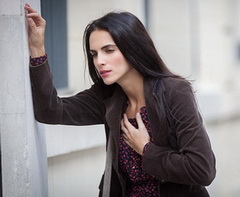
✵The postpartum wind-stroke is a wind-stroke syndrome occurring following childbirth, due to various pathogenic reasons. It is also known as wind-stroke syndrome after childbirth.
✧ In the TCM system, the pathogenic reasons for the postpartum wind-stroke normally are hurt of Qi and blood due to childbirth, get off the bed too early, hurt in a month, affected by sorrow or anger, hurt of Zang-viscera and Fu-viscera, wake up early and working early, Qi deficiency and affected by wind pathogens, wind pathogens visiting the skin channels, common symptoms observed are pain and numbness, fatigue and emaciation, short of breath, other symptoms observed include going into trance, spasm, etc.
✵Ancient herbalists who hold a syndrome differentiation viewpoint with similar explain of pathogenic reasons, and the relevant representative work are introduced and quoted:"A woman suffers from wind stroke, with paralysis of the right half of the body, what is it? It is mainly due to the hurt of Qi.
A woman suffers from wind stroke, with paralysis of the left half of the body, what is it? It is mainly due to the hurt of blood.
A woman suffers from wind stroke, with facial paralysis(deflection of mouth and eyes), barylalia(slurred speech), pain in eyes, and could not sleep, what is it? It is mainly due to blood insufficiency and is affected by wind.
A woman suffers from wind stroke, there is slim or fat, how about the difference? Mainly with phlegm for a fat person, with fire for a slim person.
A woman suffers from wind stroke, with sweating, what is it? The case wind stroke with perspiration is due to the Wei system is hurt by the wind.
A woman suffers from wind stroke, without sweating, what is it? The case wind stroke without perspiration is due to the Ying system is hurt by cold.
A woman suffers from wind stroke, difficulty in defecation or urination(constipation or urinary stoppage), what is it? The case of wind stroke with constipation or urinary stoppage, is the condition of excess, the case of wind stroke with defecation or urination uninhibited, is the condition of deficiency." [04]."A woman suffers from blood deficiency after childbirth, should observe much perspiration(sweating), affected by wind pathogens, develops to spasm and lockjaw, stiffness of the back, shaking her head, and tinnitus(ringing in ears), bent..." [06].
"Wind-stroke after childbirth: a woman gets off the bed in five to seven days after childbirth, Qi and blood are hurt, wind pathogen invading by chances of deficiency. Or get hurt from sexual intercourse, or worry and anger in the chest, disturb the harmony and orders, or take raw and hard food, Zang and Fu viscera are hurt. In the initial stage symptoms are a pain in the eyes and lockjaw, spasm and contracture of muscles, gradually affect waist and back, in case of stiffness and up of tendon and muscle, incurable. This is due to not care in daily life, not from occasionally wind-stroke..." [07].
"Wind-stroke after childbirth: a woman lose excessive volume of blood after childbirth, sudden deficiency of the liver Qi, ...as a result, unconsciousness and short of breath, sweating and cold in the skin, fainting and sudden fall, spasm of hands and feet, is the condition wind from liver deficiency, wind generates from the endogenous origin, ...a woman lack in blood support after childbirth, mostly suffers from endogenous heat from Yin deficiency, extreme heat generates wind, although its external symptoms are similar to wind, actually it is Yin deficiency in the interior, Qi lost governing." [08].Different types are introduced:
⑴.A woman suffers from wind-stroke after childbirth, due to losing excessive volume blood, Yin insufficiency in the interior, Qi lost governing. Symptoms lockjaw, lips are cyanotic, cold in muscle and sweating, or deflection of mouth and lips, spasm of hands and feet, syndromes similar to wind-stroke.
⑵.A woman suffers from wind-stroke after childbirth, due to exhaustion of Qi and blood, excessive perspiration, the vitality lost mastering, as a result, lead to opisthotonos, is the condition extreme deficiency of Jue Yin similar to Jing(spasm);
⑶.A woman suffers from cold-induced syndrome after childbirth, although there are Gang Jing(tense convulsion) or Rou Jing(sweating convulsion), but after childbirth, due to blood dryness, blood collapse;
⑷.A woman suffers from wind-stroke after childbirth, in the case with phlegm and fire.
⑸.A woman suffers from wind-stroke several days after childbirth, no clots pain in abdomen;
⑹.A woman suffers from wind-stroke after childbirth, difficulty in speech and movements of limbs(difficult to move of arms legs hands and feet);
⑺.A woman suffers from wind-stroke after childbirth, speechless or difficulty in speech;
⑻.A woman suffers from wind-stroke after childbirth, much perspiration and lockjaw, bending of back and short of breath, similar to Zhi(spasm);
⑼.A woman suffers from wind-stroke after childbirth, no perspiration and spasm;
⑽.A woman suffers from wind-stroke after childbirth, lockjaw and difficulty in speech(lockjaw, could not speak or talk);
⑾.A woman suffers from wind-stroke after childbirth, powerless and twitch(convulsion), hyperphoria with fixed eyeballs(Dai Yan) and opisthotonus(bending to backward of the body due to convulsion), sweating as pearls, two hands hold with empty, is the case incurable.
✵Although there are various pathogenic reasons of the wind-stroke, the main reason normally is due to the deficiency in the interior(internal deficiency) and affection from exogenous wind pathogen, according to the difference of the affected region, in general, it could be classified into wind-stroke affect Fu-viscera which affect at the exterior, wind-stroke affect Zang-viscera which affect at the interior, wind-stroke affect blood collaterals which affect at the middle, etc.
✵Ancient herbalists who hold a syndrome differentiation viewpoint with similar explain of pathogenic reasons, and the relevant representative work are introduced and quoted:"A woman suffers from wind stroke, because of internal deficiency and affected by wind. It is the syndrome recorded in ancient works Nei Jing(the Yellow Emperor's Inner Canon) and known as Pian Ku(similar to hemiplegia), Feng Fei, Feng Yi, Feng Bi, and into different types wind-stroke affect Fu-viscera, wind-stroke affect Zang-viscera, wind-stroke affects blood collaterals. In the condition of wind-stroke affect the Fu-viscera, is at the exterior; In the condition of wind-stroke affect the Zang-viscera, is at the interior; In the condition of wind-stroke affect the blood collaterals, is at the middle;... In the condition of wind-stroke affect the Fu-viscera, mainly at limbs, symptoms are numbness and spasm in hands and feet, aversion to wind and cold;... In the condition of wind-stroke affect the Zang-viscera, mostly stagnant the nine orifices, for examples, dazzled eyes for affection the liver, the tongue could not speak(loss of speech) for affection the heart, slow in lips and constipations for affection the spleen, nasal obstruction(stuffy nose) for affection the lung, deafness for affection the kidney, these cases are seriously sick and most of them are difficult to treat;... In the condition of wind-stroke affect the blood collaterals, symptoms are no six-meridian syndrome at the exterior, no inhibition of urination or defecation at the interior, could not lift limbs, loss of speech;... In the condition of real wind-stroke, there are also differences between Qi-phase and blood-phase;... The syndromes similar to wind-stroke, there are wind affection, dampness affection, fire affection, seasonal Qi affection, syncope of food, strain consumption, sexual strain, these are all syndromes similar to wind-stroke;... For areas north or south, body constitution deficiency type or excess type, there are differences, in general, the syndromes between man and woman are similar..." [05].
"Wind-stroke from extreme deficiency: A woman gets wind-stroke after childbirth, due to losing too much blood, Qi lost master, as a result, lips turn cyanotic and cold limbs(reverse cold in hands and arms, feet and legs), perspiration, dazzled and unconscious, life is in danger in a short time, is the condition wind-stroke due to extreme deficiency..." [07].(This type of wind-stroke from extreme deficiency after childbirth is a very difficult case).
"Wind-stroke after childbirth: A woman suffers from health Qi sudden deficient after childbirth, joints opening, wind pathogen easily invading, lost proper regulation, affected by wind, lost consciousness(unconsciousness), mouth and eyes wriggle, spasm and contracture of hands and feet, bending of the body, is the case of Feng Wai Zhong(exogenous wind-stroke)..." [08].
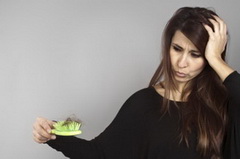 ✵The postpartum deficiency wind stroke is a wind stroke occurring following childbirth, due to various pathogenic reasons. In the TCM system, the pathogenic reasons for the postpartum deficiency wind stroke normally are excessive bleeding, and loss of Qi, etc.
✵The postpartum deficiency wind stroke is a wind stroke occurring following childbirth, due to various pathogenic reasons. In the TCM system, the pathogenic reasons for the postpartum deficiency wind stroke normally are excessive bleeding, and loss of Qi, etc.
✵The postpartum deficiency wind stroke common types are: postpartum deficiency wind stroke, cyanotic lips and body cold, perspiration, dizziness and coma(unconsciousness), this is the case of postpartum deficiency wind stroke due to excessive bleeding, loss of Qi, great deficiency. Normally it is a case in danger.
✵Ancient herbalists who hold a syndrome differentiation viewpoint with similar explain of pathogenic reasons, and the relevant representative work are introduced and quoted:"Case (a woman suffers from) postpartum wind stroke of hands and feet, is the condition of postpartum wind stroke mainly due to Qi and blood deficiency." [02].
"A woman suffers from sudden numbness after childbirth, what is it? It is the condition that due to the great deficiency of Qi and blood..." [04].
✵The postpartum wind-stroke common types are:
⑴.A woman suffers from wind-stroke after childbirth, wind-deficiency, headache, and pain in eyes, wild talk sometimes.
⑵...., frightened or fear, uncertainty of wills, go into a trance, wild talk.
⑶...., contracture or spasm of body and back as being trapped, and thirst.
⑷...., contracture or spasm of limbs, dragging pain of muscle, unable to move around, similar as opisthotonus.
⑸...., affected by wind and cold pathogen in shade, or into a panting, blue lips and black nose.
⑹...., polydypsia(vexation and thirst).
⑺...., hemiplegia(paralyzed on one side), paralysis of the limbs(paralysis of hands and feet, arms and legs), tongue-tied, go into trance and amnesia(forgetfulness), mental uncertainty.
- Postpartum palpitation wind stroke.
-
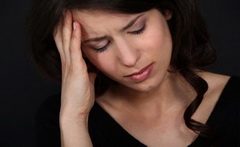
✵The postpartum palpitation wind stroke is a wind stroke occurring following childbirth due to various pathogenic reasons.
✧ In the TCM system, the pathogenic reasons for the postpartum palpitation wind stroke normally include old wind pathogens, deficiency of heart Qi, common symptoms depression and short of breath, eyes open and lockjaw, similar to dysentery, palpitation, paraphasia(deranged speech).
✵The postpartum palpitation wind stroke common types are known including:
⑴.A woman suffers from palpitation wind stroke after childbirth, heart Qi deficiency, frightened and wild talk, or sing cry evil laugh, the indeterminacy of mind.
⑵...., deficiency weak and emaciation, excessive sweating, diarrhea, great deficiency. Similar to wind stroke, wild talk, depression, and unconsciousness.
⑶...., wild talk, unsteadiness, confusional state, deficiency of heart Qi, it is the case of postpartum palpitation wind stroke due to wind pathogens.
⑷...., an alternation between palpitation and flustered, wild talk or paraphasia(deranged speech), absent-minded and fall into a trance, it is the case of postpartum palpitation wind stroke due to heart deficiency.
- Postpartum wind stroke and trance.
-
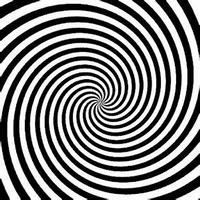
✵The postpartum wind stroke and trance is a wind stroke and trance state occurring following childbirth, due to various pathogenic reasons.
✧ In the TCM system, the pathogenic reasons for the postpartum wind stroke and trance are normally including hurt of blood and Qi for the childbirth, deficiency of Zang and Fu-viscera, the heart could not regulate other viscera, insufficiency of Ying and Wei(nutrient Qi and defense Qi), affected by wind pathogens.
✵The postpartum wind stroke and trance common types are known including:
⑴.A woman suffers from wind stroke and trance after childbirth, sudden suffering, palpitation, wild talk, or paraphasia(deranged speech), into a trance, it is a case of postpartum wind stroke and trance due to deficiency of the heart.
⑵...., an alternation between palpitation and flustered, the indeterminacy of mind, irritable and into a trance.
⑶...., go into a trance, difficult in speech, numbness of hands and feet.
- Postpartum wind-stroke and spasm of limbs.
-

✵The postpartum wind-stroke and spasm of limbs is a case of wind stroke and spasm of limbs occurring following childbirth, due to various pathogenic reasons.
✧In the TCM system, the pathogenic reasons for the postpartum wind-stroke and spasm of limbs normally include deficiency of Qi and blood, asthenia of Zang-viscera and Fu-viscera, early wake up and work before dawn, deficiency not recovered and affected by wind-cold pathogen visiting the channels in the skin, lead to numbness, fatigue emaciation and short of breath, affect the muscle and channels, spams and contracture.
✵Ancient herbalists who hold a syndrome differentiation viewpoint with similar explain of pathogenic reasons, and the relevant representative work are introduced and quoted:"A woman suffers from Qi-deficiency, wind affection and wind enters into Yang meridians, or blood deficiency after childbirth, affected by wind during perspiration, stiffness of the body and lockjaw, counter-bending of the back and waist, is the syndrome of spasm. For the Tai Yang meridian was affected first by wind, and then affected by cold, as a result, symptoms are similar to epilepsy.
In conditions (a woman suffers from) wind-stroke and lockjaw, is mainly due to deficiency of the body and affected by wind, enter into the cheeks. The three Yang meridians of hand, connect to the cheeks, up to the mouth, affected by wind pathogen then spasm, as a result, the maxillary joint retract and lockjaw..." [05]."A woman suffers from wind stroke after childbirth, spasm of tendons and muscles, all due to Qi and blood deficiency, wind and cold pathogen invading the skin layer, as a result, pain and numbness of the four limbs(hands and arms, feet and legs)..." [06].
"Spasm syndrome after childbirth: the spasm syndrome after childbirth, is the condition Yin blood is greatly insufficient. Its symptoms observed are bent backward of the waist and back, hyperphoria with fixed eyeballs and euthyphoria(look steadily at), or four limbs are stiff and straight, a convulsion of the body. In cold-induced disease, although there are differences between Gang Jing(tonic convulsion), Rou Jing(flaccid convulsion, or sweating convulsion), in general, are all due to blood exhaustion and blood dryness;...for the reasons of convulsions, in general for the cold-induced syndrome, mistakenly induced perspiration greatly and loss of body fluid, or induced purgation greatly and loss of Yin, or ulcer and pus, after severe diarrhea, then this syndrome will be observed. So for conditions after childbirth, also in the case loss too much blood, or from greatly induced perspiration or purgation. It is a condition that the primordial Qi is extremely deficient, the blood is in a withered and collapsing state;... If it is misdiagnosed as the phlegm of wind and uses recipes for dissipating or resolving food retention, surely will pass away." [07].
"Spasm after childbirth: a woman suffers from spasm and pains of tendons and collaterals, the native folk name is Ji Zhua Feng(chicken claw wind), blood deficiency after childbirth, could not support tendons and collaterals, ...in the case also affected by exogenous wind pathogen, ..." [09].
✵The postpartum wind-stroke and spasm of limbs common types are known including:
⑴.A woman suffers from wind-stroke after childbirth, contracture and spasm of limbs and pains, stiffness of neck and back.
⑵...., uneasy sleeping and sitting, spasm of limbs and muscles, or stiffness of limbs and muscles.
⑶...., contracture and spasm of limbs and muscles, pains.
⑷...., contracture and spasm of limbs and muscles, pains, mind and heart are annoyed and vexed, stiffness(rigidity) of back and neck.
⑸...., lockjaw, maxillary joint retract.
⑹...., lockjaw, maxillary joint retract, deviation of the eyes and mouth.
⑺...., deviation of the mouth.
- Postpartum wind stroke with spontaneous perspiration.
-
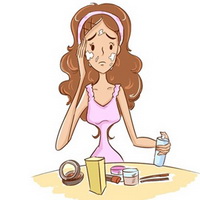
✵The postpartum wind stroke with spontaneous perspiration normally affects after childbirth, it is a syndrome wind stroke and spontaneous perspiration(spontaneous sweating.)
✧In the TCM system, the pathogenic reasons for the postpartum wind stroke with spontaneous perspiration are normally including an imbalance of Ying and Wei with affection of wind pathogen, the striae and interstitial space(Cou Li) is not solid, ever took recipes for wind syndrome, weakness of Yang Qi. The spontaneous perspiration might be accompanied by night sweating.
✵Ancient herbalists who hold a syndrome differentiation viewpoint with similar explain of pathogenic reasons, and the relevant representative work are introduced and quoted:"Wind stroke with spontaneous perspiration:... In the case of spasm, the twitch of the mouth and eyes, sweating of the whole body..., should recover the Ying and Wei system to dispel wind pathogen;... In the condition of the striae and interstitial space are not solid;... In the condition ever took recipes for wind syndrome;... In the condition weakness of Yang Qi..." [05].
- Postpartum wind stroke with hemiplegia.
-

✵The postpartum wind stroke with hemiplegia normally affects after childbirth, it is a syndrome wind stroke and hemiplegia(paralysis of one side of the body), the symptoms are paralysis of one side of the body, muscles are thin and withered, pain in bones and joints.
✧In the TCM system, the pathogenic reasons for the postpartum wind stroke with hemiplegia normally include loss of essence, blood exhaustion, excessive heat, dryness of body fluid.
✵Ancient herbalists who hold a syndrome differentiation viewpoint with similar explain of pathogenic reasons, and the relevant representative work are introduced and quoted:"Wind stroke with hemiplegia, its symptoms are paralysis of one side, withered and thin of muscles, pain in bones and joints. The ancient book Nei Jing(the Yellow Emperor's Inner Canon) recorded: perspiration and hemiplegia. As branches of trees, body fluid could not arrive and then withered, hurt by the wind...; In general, the syndrome is mostly due to loss of nutritional support, lead to the withering of essence and blood...; Wind affection and heat turn excessive, excessive heat then water is dried, the water is dried and Qi lost support, as a result, the essence is lost, this is the reasons where the wind syndrome comes..." [05].
- Postpartum blood-wind.
-

✵The postpartum blood-wind normally affects after childbirth, is a syndrome also known as the wind of blood, due to Qi and blood deficiency, the striae and interstitial space not tight, affected by wind and cold, as a result, the pathogenic reasons and positive energy fight each other, the normal syndromes are:(1).blood-wind with joint pain, (2).blood-wind with white tiger-biting, (3).blood-wind with urticaria and itching, (4). Blood-wind with cephalea.
✧In the TCM system, the pathogenic reasons for the postpartum blood-wind syndromes are introduced:
⑴.Blood-wind with joint pain: the common symptoms of blood-wind with joint pain are pains in joints and bones, fever in body and limbs, dryness in mouth and throat, mainly due to deficiency of Qi and blood, the striae and interstitial space not tight, other reasons might be involved are: a disorder of diet and drink, deficiency of the spleen and stomach, blood heat in the liver meridian, blood deficiency in the liver meridian, wind dampness with phlegm, wind dampness hurt the spleen, summer dampness hurt Qi, Qi-stagnancy hurt the spleen and liver, stomach Qi is hurt, blood stasis, tiredness, and lassitude.
⑵.Blood-wind with white tiger-biting: the common symptoms of blood-wind with white tiger-biting, are sudden contracting pains as biting by a white tiger, internal heat or hot flash in the late afternoon, spontaneous sweating or night sweating, or irregular menstruation, tastelessness in diet, etc, mainly due to physical deficiency and affected by wind, attack with blood, or affect in the skin layer, or sudden attack as biting by a tiger, other reasons might be involved are: dampness and heat, a disorder of diet and drink, a disorder of seven emotions and consumption, deficiency and hurt of the spleen and stomach.
⑶.Blood-wind with urticaria and itching: the common symptoms of blood-wind with urticaria and itching are urticaria and itching, dysphoria with smothery sensation(vexation and heat from inside), mainly due to physical deficiency and affected by wind and cold, exposed to cold air after a bath with sweating. Other symptoms are: swellings grow on the skin, pain or itching not regularly, or dripping pus, fever and polydipsia(irritable or vexed, thirst), dizziness and dazzled, turn to serve in the late afternoon, or alternative chills and fever, irregular menstruation, or anger and swellings appear on the skin, pain itching and alternative chills fever; or fever at night, thirst and wild talk; etc.
⑷.Blood-wind with cephalea: the blood-wind with cephalea is also known as blood-wind with headache, normally affect a woman who suffers from wind syndrome of the head, five among ten cases, fainting as sitting on ships or cars. In general, due to blood deficiency of the liver meridian, and affection from wind pathogen. Differences in six meridians: the cephalea or headache of foot Tai Yang, symptoms are pulse is floating and tight, aversion to wind and cold; the cephalea or headache of Shao Yang, symptoms are pulse is string-like and fine, alternative chills and fever; the cephalea or headache of foot Yang Ming, symptoms are headache, fever, pain in eyes, dryness in the nose, aversion to cold and fever, the pulse is floating slow and long; the cephalea or headache of hand Tai Yang, symptoms are with phlegm and heavy in body, or pain in the abdomen, is a syndrome of phlegm stasis, the pulse is sinking and slow; the cephalea or headache of foot Shao Yin, symptoms are cold in feet and Qi counter flows, as reverse cold limbs(reverse cold in hands and feet, arms and legs), the pulse is sinking and fine; the cephalea or headache of foot Jue Yin, symptoms are spit saliva and foams, reverse cold, the pulse is floating and slow.
✵Ancient herbalists who hold a syndrome differentiation viewpoint with similar explain of pathogenic reasons, and the relevant representative work are introduced and quoted:"A woman suffers from blood-wind, due to Qi and blood deficiency, the striae and interstitial space are not tight, affected by wind and cold, as a result, the pathogenic reasons and positive energy fight each other, pain in bones and joints, fever of the body and limbs, dry in mouth and throat.
A woman suffers from wind syndrome of the head, five among ten cases, fainting as sitting on ships or cars. In general, due to blood deficiency of the liver meridian, and affection from wind pathogen." [05].
- Postpartum similar to stroke syndrome.
-

✵The postpartum similar to stroke syndrome normally affects after childbirth, a syndrome with sudden exhaustion of blood and Qi, bones and muscles lost support from blood, as a result, lockjaw, spasm in hands and feet, similar symptoms to wind-stroke.
✧In the TCM system, the pathogenic reasons for the postpartum syndrome similar to wind-stroke normally include sudden exhaustion of Qi and blood, bones and muscles lost support from the blood.
✵Ancient herbalists who hold a syndrome differentiation viewpoint with similar explain of pathogenic reasons, and the relevant representative work are introduced and quoted:"Case (a woman suffers from) sudden exhaustion of blood and Qi, bones of the body collectively lack support and nutrients from blood, suddenly lockjaw and tight teeth, spasm in hands and feet, similar to wind-stroke, also similar to epilepsy." [03].
"Case after childbirth, (a woman suffers from) blood insufficiency, lockjaw and stiffness of the neck, spasm, similar to wind-stroke. Other symptoms that might be observed are: with phlegm, hurt from meat, hurt from diet or wheat diet, constipation, thirst, much sweating, frightened, etc.
Case after childbirth, (a woman suffers from) wind-stroke, faintly in a trance, difficulty in speech, difficulty in movement of limbs(hands, feet, legs, arms)." [03]."Similar to stroke after childbirth: a woman suffers from lockjaw, spasm of tendons, similar to wind-stroke, due to Qi and blood could not support the Ying and Wei system..." [08].
- Postpartum limbs numbness.
-
✵The postpartum limb numbness or numbness in the legs and arms occurring following childbirth, due to various pathogenic reasons majorly from blood deficiency and wind attack, other symptoms are itching in the skin and numbness, etc.
✵Ancient herbalists who hold a syndrome differentiation viewpoint with similar explain of pathogenic reasons, and the relevant representative work are introduced and quoted:"A woman suffers from numbness in four limbs(hands and arms, feet, and legs), itching skin and numbness, are all due to blood deficiency and wind attack..." [07].
References:
-
- 01.Postpartum wind-stroke and related syndromes:an introduction of postpartum wind-stroke, postpartum wind-stroke and spasm of limbs, postpartum blood-wind, and related syndromes.
- 02.Song Shi Nǚ Ke Cuo Yao(the Synopsis of Song's Gynaecology).By 宋林皋(Sòng Lín Gāo)[Ming].
- 03.Jiēzhāi Gōng Tāi Chǎn Yī àn(Births Cases of Jie Zhai Gong).By 王纶(Wáng Guān)[Ming].
- 04.Fù Kē Bǎi Biàn(the Differentiations in Hundred Syndromes of Gynaecology).By 庄履严(Zhuāng Lǚyán)[Ming].
- 05.Nǚ Ke Bǎi Xiào Quán Shū(the Efficacious Complete Book of Gynaecology).By 龚居中(Gōng Jūzhōng)[Ming,1630].
- 06.Huang Shi Nǚ Ke(the Synopsis of Huang's Gynaecology).By 黄彦荣(Huáng Yànróng)[Ming,1504].
- 07.Ye Shi Nǚ Ke Zhèng Zhì(the Syndromes and Therapeutics of Ye's Gynaecology).By 叶桂(Yè Guì)[1817].
- 08.Fù Kē Bèi Kǎo(the References of Gynaecology).By 何应豫(Hé Yīngyù)[1820].
- 09.Fù Kē Liáng Fāng(the Effective Prescription of Gynecology).By 何梦瑶(Hé Mèngyáo)[1751].
